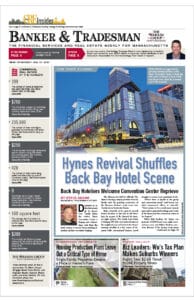Founded by Pilgrims, birthplace of the Revolution, home to the Transcendentalists and the abolitionists, Massachusetts has a surfeit of remarkable history – and a surplus of all the remarkable old properties in which it took place. But marketing a home with historic associations can come with some unique challenges, brokers say, not the least of which is overcoming buyers’ misconceptions about owning historic property.
The first thing to tackle can be getting buyers to see the potential – and not the potential problems – that come with owning a historic home. One-hundred-plus-year-old properties are rarely designed with contemporary tastes in mind, and staging a property to illustrate how to furnish an unusual space or emphasize the unique period features is one of the first things agents must look to, said Jim Nemetz, senior vice president at Hammond Residential Real Estate in Brookline. He recently sold Sevenels, the former home of Pulitzer-prize winning poet Amy Lowell, of the influential Lowell family.
“The furniture, more than anything, gives you an idea of the scale of the house. When you have very unusual spaces, sometimes you have to use staging to show people how to live in the property,” said Nemetz.
Another common stumbling block for buyers is fear of the potential costs and trouble involved with renovating the property to meet their needs. Historic properties often face more restrictions on development than contemporary homes, and Massachusetts is chock-a-block with them: The Bay State has 185 designated National Historic Landmarks and 4,265 properties listed on the National Historic Register, in both cases the second most in the country, just behind New York State. Beyond the federally recognized properties, which can have some of the severest restrictions, many local towns have historic commissions that retain lists of local properties with historic significance that may require special permission to alter – the commission for the town of Arlington alone tracks more than 1,200 properties in its town.
Under current state laws, however, historic commissions only have veto power over substantial changes to the property’s exterior, specifically the portions visible from the street. Buyers may actually overestimate the difficulty of altering a historic home, brokers say; while having to obtain approval from a historic commission can present an extra hoop to jump through, buyers often find towns are happy to work with them to approve changes. And often the changes most desired by contemporary owners – adding an extension or creating an open-plan kitchen/family room – affect only the interior of the property, and therefore require only the usual permits needed for any large renovation.
“It’s another layer. They oversee the exterior changes, but my experience is they’re pretty reasonable. You can work with them. I always say to [buyers], if you’re practical and reasonable, you can get stuff done,” said Micéal Chamberlain, broker-owner of Historic Homes in Newton.
Potential For Change
But the necessity for renovations does affect the buyer pool interested in the properties. With Sevenels, “the people that are looking at this house, even though it’s a mid-fours price, it’s really a $7 or $8 million-dollar buyer,” said Nemetz, because even though the property is in excellent structural condition, making the adjustments and upgrades necessary to suit contemporary tastes will require a substantial investment.
As a broker, being prepared to illustrate a property’s potential for change can be a worthwhile investment. Chamberlain has gone so far as to have an architect draw up plans for potential renovation schemes for several properties he’s listed so that he can present them to interested sellers who are touring the property. Being able to see that a small kitchen can be easily expanded or a walk-in closet added to a master suite can help buyers more easily envision themselves in the space, even if they end up choosing their own architect when it comes time to complete the work, he said.
Having a property with historic associations can also present considerable advantages when it comes time to sell, points out Jack Cotton. Cotton, a longtime luxury broker on Cape Cod, acted as the listing agent in the 2012 sale of the estate of philanthropist and designer Bunny Mellon.
“The history can help you find a buyer. Another word for history is ‘story’ – people still want, when they buy a second home or a vacation home, to finish their family’s story. The better a story that the property has, the better chance you have of selling it. People really want to be a part of it,” said Cotton.
He was involved in a sale a few years ago in which the new buyers actually asked the former homeowners if they could retain some of the family pictures that hung on the wall of the house, which featured snapshots from family beach and boating expeditions going back to the 1940s.
For agents, however, there is one potential pain point which often requires some finessing: The seller of a historic property, often a history lover themselves, may be reluctant to let the place go to a new buyer who plans to make substantial changes to the house, or perhaps even tear it down. That can limit their options and make it more difficult to sell a property. At the same time, brokers say, it’s important to listen to the seller’s needs – even in a case where the seller may prefer to sell to a preservationist, the difference in a property’s value as-is verses as a developable parcel can be significant enough to change their minds.
“I can’t think of a situation where we’ve represented a older home where the owners have said, ‘We don’t care [who buys it.]’ They do care. Sometimes as brokers we can make a lot more money going in the [developer’s] direction – but I’m a believer in preservation,” said Chamberlain.








